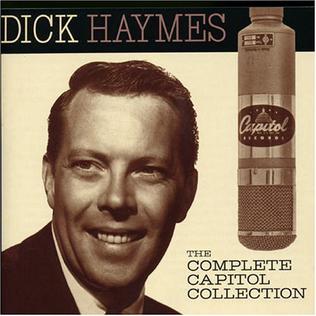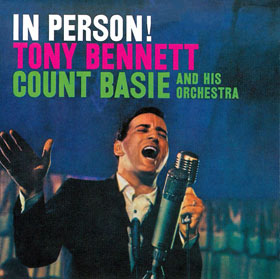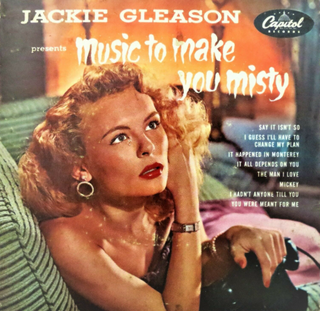
This is a list of notable events in music that took place in the year 1937.

John Marshall Alexander Jr., known by the stage name Johnny Ace, was an American rhythm-and-blues singer. He had a string of hit singles in the mid-1950s. Alexander died of an accidental self-inflicted gunshot wound at the age of 25.
"The Man that Got Away" is a torch song, published in 1953 and written for the 1954 version of the film A Star Is Born. The music was written by Harold Arlen, and the lyrics by Ira Gershwin. In 1954, it was nominated for the Academy Award for Best Original Song. In 2004, Judy Garland's performance of the song was selected by the American Film Institute as the eleventh greatest song in American cinema history.

Trilogy: Past Present Future is the 55th studio album by American singer Frank Sinatra, released in March 1980 through Reprise. The triple album included his last Top 40 hit: "Theme from New York, New York".

The Capitol Years is a 1990 compilation album of the U.S. singer Frank Sinatra.
"They Can't Take That Away from Me" is a 1937 popular song with music by George Gershwin and lyrics by Ira Gershwin. It was introduced by Fred Astaire in the 1937 film Shall We Dance and gained huge success.

The Complete Ella Fitzgerald Song Books were a series of eight studio albums released in irregular intervals between 1956 and 1964, recorded by the American jazz singer Ella Fitzgerald, supported by a variety of orchestras, big bands, and small jazz combos.

The Complete Capitol Singles Collection is a compact disc box set by the American singer Frank Sinatra, released on Capitol Records in 1996. The four-disc set contains all 45 singles released by Sinatra during his tenure at the label between 1953 and 1961. Of those, 25 made the Top 40 on the Billboard singles chart. It does not include releases specifically for jukeboxes or for extended play singles, with one exception. The original tapes were digitally remastered by Bob Norberg.

Swingin' Easy is a 1957 studio album by the American jazz singer Sarah Vaughan.

"Somebody Loves Me" is a popular song, with music written by George Gershwin, and lyrics by Ballard MacDonald and Buddy DeSylva. The song was published in 1924 and featured in George White's Scandals of 1924.

MTV Unplugged is a live album by Tony Bennett that was released in 1994. Backed by the Ralph Sharon Trio, Bennett appeared on the TV show MTV Unplugged to showcase the Great American Songbook with guest appearances by Elvis Costello and k.d. lang.

The Complete Capitol Collection is a compilation album from Dick Haymes released in 2006.

In Person! is a 1959 album by Tony Bennett, accompanied by the Count Basie Orchestra.

All or Nothing at All is a studio album by Billie Holiday, released in 1958 on Verve Records, catalog MGV8329. There are 12 songs on the LP taken from five different recording sessions that took place in 1956 and 1957. Holiday was backed by a "relaxed and understanding" small combo which included the trumpeter Harry "Sweets" Edison and the saxophonist Ben Webster. A 1959 New York Times article noted that Holiday's voice "had become a very limited instrument which she used with the craft and guile of an aging pitcher who can no longer pour his fast one across the plate."

After Hours with Miss "D" is a 1954 studio album by Dinah Washington. The 2004 CD reissue included an extended take of "Blue Skies".

Open Fire, Two Guitars is an album by American pop singer Johnny Mathis that was released on January 5, 1959, by Columbia Records on which he opts for guitar and bass accompaniment instead of performing alongside an orchestra. Two new songs are mixed in with covers of popular standards.

Swing jazz emerged as a dominant form in American music, in which some virtuoso soloists became as famous as the band leaders. Key figures in developing the "big" jazz band included bandleaders and arrangers Count Basie, Cab Calloway, Jimmy and Tommy Dorsey, Duke Ellington, Benny Goodman, Fletcher Henderson, Earl Hines, Glenn Miller, and Artie Shaw. Duke Ellington and his band members composed numerous swing era hits that have become standards: "It Don't Mean a Thing " (1932), "Sophisticated Lady" (1933) and "Caravan" (1936), among others. Other influential bandleaders of this period were Benny Goodman and Count Basie.

Music for Tonight is a studio album of "mood music" by television host, Steve Allen. Allen played piano and was backed by an orchestra. It was released in 1955 on Coral Records. It entered Billboard magazine's pop album chart on May 14, 1955, peaked at No. 7, and remained on the chart for 10 weeks. With the album's success, Coral signed a two-year contract with Allen, hoping to develop him as a counterpart to the success of Jackie Gleason's popular "mood music" albums on the Capitol label.

Music to Make You Misty, also known as Jackie Gleason Presents Music to Make You Misty, is a studio album by television personality, Jackie Gleason. It was released in 1953 on Capitol Records. It was originally issued as a 10-inch extended play record with eight songs. It was reissued several months later as an album with eight additional songs. The musicians featured on the album included Bobby Hackett on trumpet and Toots Mondello on alto sax.

Jackie Gleason Plays Romantic Jazz, also known as Romantic Jazz, is a studio album by television personality, Jackie Gleason. It was released in 1955 on Capitol Records. Gleason conducted the orchestra.


















